Bowling Green Vulture Control ~ 270-297-4718
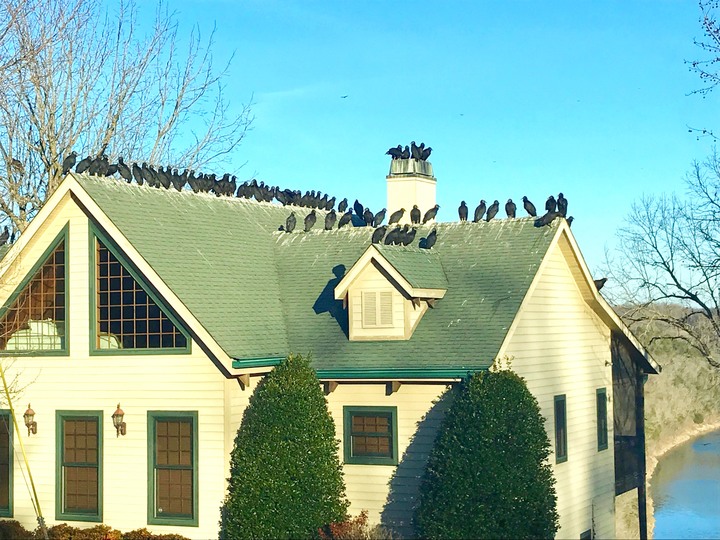 Vulture Problems are a rising issue, leaving home and business owners little options as Vultures (Black and Turkey Vultures) are protected under the Federal Migratory Bird Treaty. Our Certified Specialists at Animal Pros can help with Vulture Problems, and our proven deterrent techniques to alleviate roosting and damage areas. Vultures love roof tops, building tops, and high vantage points and can often be seen in flocks of 70 or more. Large flocks can quickly damage any structure or roofing, and can create other issues from the amount of droppings left behind. Be pro-active, and do not let damage continue, and call one of our specialists immediately. Our deterrent techniques offer proven results that break the behavior pattern of Vultures, and we offer cleaning, disinfecting, deodorizing, of the affected area as well.
Vulture Problems are a rising issue, leaving home and business owners little options as Vultures (Black and Turkey Vultures) are protected under the Federal Migratory Bird Treaty. Our Certified Specialists at Animal Pros can help with Vulture Problems, and our proven deterrent techniques to alleviate roosting and damage areas. Vultures love roof tops, building tops, and high vantage points and can often be seen in flocks of 70 or more. Large flocks can quickly damage any structure or roofing, and can create other issues from the amount of droppings left behind. Be pro-active, and do not let damage continue, and call one of our specialists immediately. Our deterrent techniques offer proven results that break the behavior pattern of Vultures, and we offer cleaning, disinfecting, deodorizing, of the affected area as well.
Contact a Animal Pros professional, our Vulture service includes:
- A on site evaluation.
- Inspection of activity, roosting, and nesting.
- Inspection of damage, droppings, and problem.
- Professional deterrent installation recommendations.
- Vulture control options.
- Options to fit a budget.
- Realistic expectations.
- Permanent Solutions.
Animal Pros bird deterrents are effective and include bird or raptor wire, electrical shock track, tree shock, bird netting, grid wire, laser deterrent technology, and more. Each location of damage from vultures is different, and each deterrent is site specific for best results, and a thorough evaluation of the problem needs to be addressed. Call our certified specialists for help with any vulture problems for your home or business, and stop the damage before it gets worse.
Vultures On Roofs
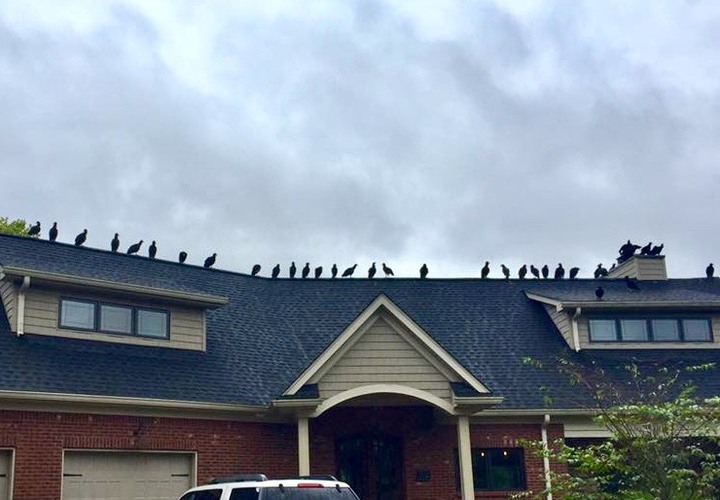 When a committee of vultures roost on roof tops of a residential home or commercial building, they can be very destructive. Vultures, better known as buzzards, are common throughout the state of Kentucky. Vultures will not only rip into and tear off shingles and rubber roofing, but they have also been known to eat shingles. During warm summer months, vultures will defecate on their legs to help keep cool. These droppings that accumulate on rooftops are highly acidic and corrosive, and will stain and deteriorate roofing materials over time. There are many suggestions online including effigy’s, wire or fishing line, and scare tactics that will ultimately be ineffective. For professional results contact a Animal Pros specialist today for help.
When a committee of vultures roost on roof tops of a residential home or commercial building, they can be very destructive. Vultures, better known as buzzards, are common throughout the state of Kentucky. Vultures will not only rip into and tear off shingles and rubber roofing, but they have also been known to eat shingles. During warm summer months, vultures will defecate on their legs to help keep cool. These droppings that accumulate on rooftops are highly acidic and corrosive, and will stain and deteriorate roofing materials over time. There are many suggestions online including effigy’s, wire or fishing line, and scare tactics that will ultimately be ineffective. For professional results contact a Animal Pros specialist today for help.
Common Nuisance Concerns
Vultures are labeled as a nuisance pest bird, even though they are beneficial to the environment. Vultures will often seek building rooftops, trees, and chimneys, or any area that offers a high vantage point. When vultures increase in numbers, activity can become damaging to any building or home around. Common nuisance complaints we receive include:
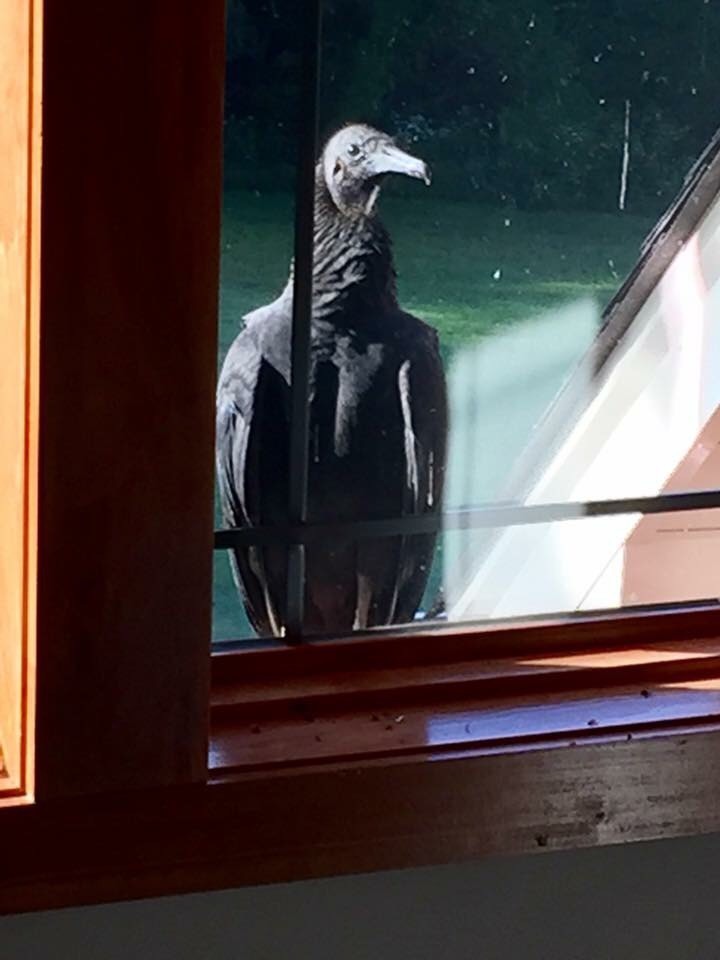
- Vultures on a rooftop.
- Vultures in a warehouse.
- Vultures on ledges.
- Vultures on a chimney.
- Vultures in the eaves or window dormers.
- Droppings all over a building.
- Nesting and droppings clogging the gutter.
- Contamination of food and products.
- Damage to machinery.
- Damage to ventilation system.
- Vultures in the trees.
- Vulture control at a airport.
- Vulture control for a military base.
Vulture Damage From Droppings
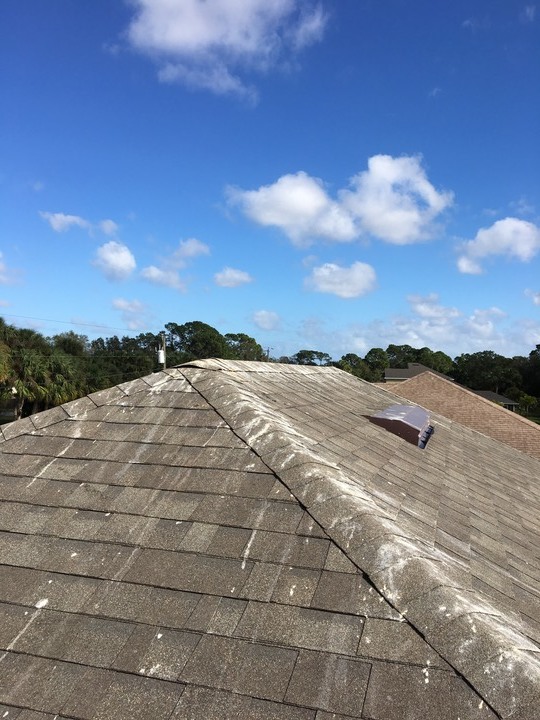 Vultures can create a huge mess of droppings and nesting that can hold bacteria and pathogens, as there are more than 25 human communicable diseases associated with vulture droppings. As the birds continually move over dried droppings, fungus spores or fecal particulates can become airborne. Histoplasmosis is one of the most common zoonotic diseases associated with vulture droppings, therefore professional help is recommended. These birds defecate at a larger rate than smaller birds, and can easily create a unsightly mess. This can be a issue if roosting next to a ventilation system on a roof, directly overhead of a public walkway, or on a tower. Vulture Droppings are so highly corrosive , we have seen them eat through metals. Droppings will accelerate the deterioration of a building, and increase costs of maintenance greatly. Contact a Animal Pros bird specialist today for remediation and clean up of bird droppings at your home or business.
Vultures can create a huge mess of droppings and nesting that can hold bacteria and pathogens, as there are more than 25 human communicable diseases associated with vulture droppings. As the birds continually move over dried droppings, fungus spores or fecal particulates can become airborne. Histoplasmosis is one of the most common zoonotic diseases associated with vulture droppings, therefore professional help is recommended. These birds defecate at a larger rate than smaller birds, and can easily create a unsightly mess. This can be a issue if roosting next to a ventilation system on a roof, directly overhead of a public walkway, or on a tower. Vulture Droppings are so highly corrosive , we have seen them eat through metals. Droppings will accelerate the deterioration of a building, and increase costs of maintenance greatly. Contact a Animal Pros bird specialist today for remediation and clean up of bird droppings at your home or business.
Bowling Green Vulture Control & Removal
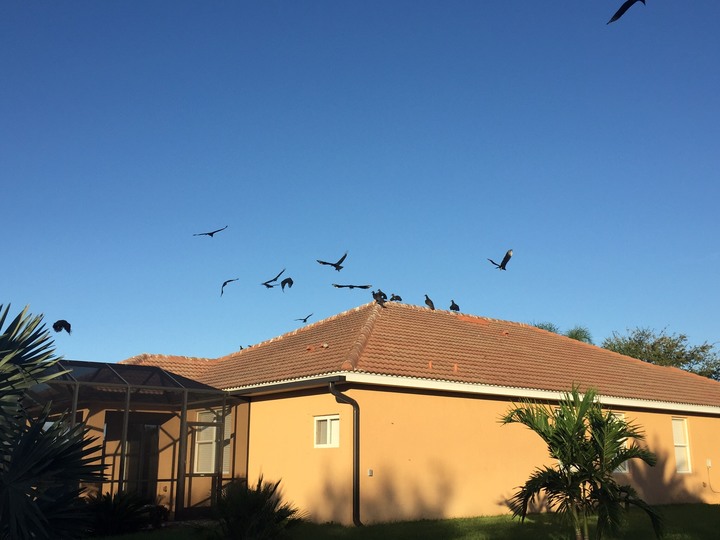 Vulture removal and control is often needed to remove the number of birds to a acceptable level, or make the area unappealing. Federal permits are available for removal or control by USFWS. In certain situations, removal and control may not be necessary with the right deterrent installed, as the vultures will no longer be able to roost there. Vulture removal and control is often performed with specific control methods and deterrents. Contact a professional at Animal Pros for expert help in removing vultures. In addition to being bird deterrent certified, we are also certified urban marksman.
Vulture removal and control is often needed to remove the number of birds to a acceptable level, or make the area unappealing. Federal permits are available for removal or control by USFWS. In certain situations, removal and control may not be necessary with the right deterrent installed, as the vultures will no longer be able to roost there. Vulture removal and control is often performed with specific control methods and deterrents. Contact a professional at Animal Pros for expert help in removing vultures. In addition to being bird deterrent certified, we are also certified urban marksman.
Why are Vultures Attracted To a Building?
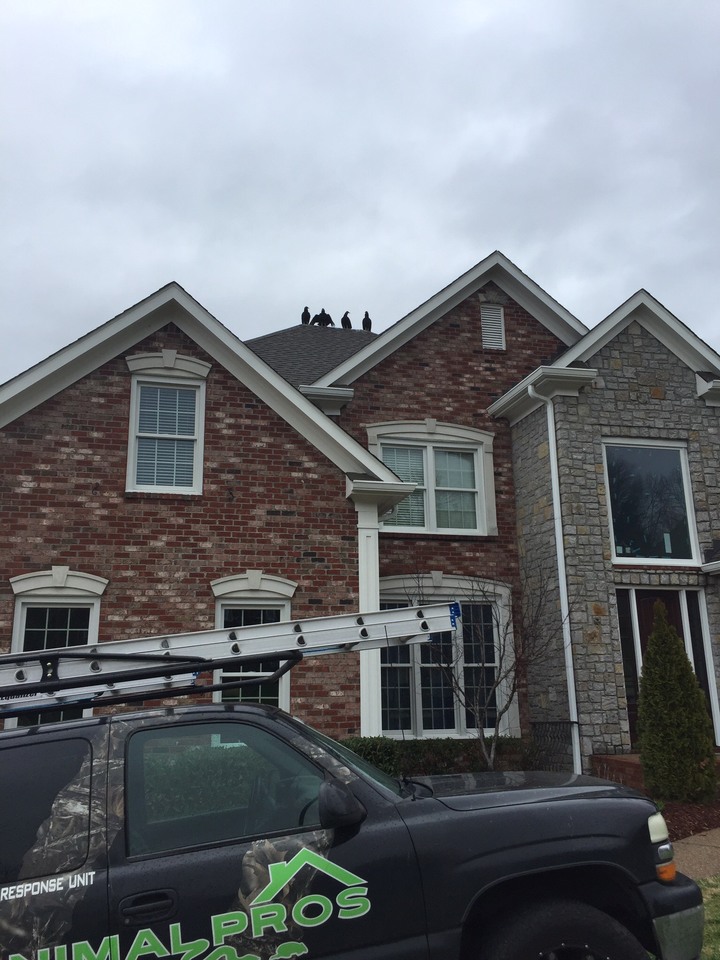 Vultures are commonly attracted to architectural buildings and man-made structures, utilizing structural protected areas that offer a high vantage point and shelter from the environment. Vultures will usually stay in these areas especially if there is a dead animal nearby. Simple modification of certain areas experiencing vulture problems can make a long term solution. Vultures will commonly be drawn to near level, flat ledges, towers, roofs, roof vents and AC units, shelfs, peaks, light posts, signs, and other area that offer protection. Vultures are highly dependent of human and animal activity, and will often be found in city buildings, parks, by roads and highways, yards, electric wires, bridges, and other structures.
Vultures are commonly attracted to architectural buildings and man-made structures, utilizing structural protected areas that offer a high vantage point and shelter from the environment. Vultures will usually stay in these areas especially if there is a dead animal nearby. Simple modification of certain areas experiencing vulture problems can make a long term solution. Vultures will commonly be drawn to near level, flat ledges, towers, roofs, roof vents and AC units, shelfs, peaks, light posts, signs, and other area that offer protection. Vultures are highly dependent of human and animal activity, and will often be found in city buildings, parks, by roads and highways, yards, electric wires, bridges, and other structures.
Black Vulture (Coragyps atratus)
- Height: 24″-29″
- Diet: Carnivorous, eating carrion, dead animals large and small, and has been known to eat live newborn calfs.
- Breeding: Occurs starting in January..
- Gestation: 37 – 42 Days.
- Reproduction: 1-3 eggs.
- Habitat: Urban areas, common around man-made structures and public areas with the availability of food.
- Legal Status: Common throughout Kentucky, and protected under the Federal Migratory Bird Treaty Act, although recent state law allows no protection.
- Other Names: Buzzards.
- Interesting Facts: Black vultures will often follow turkey vultures, as turkey vultures possess excellent smelling capabilities, finding dead animals. Has been known to attack live newborn calfs.
Turkey Vulture (Cathartes aura)
- Height: 25″-30″
- Diet: Carnivorous, eating carrion, dead animals small and large.
- Breeding: Occurs starting in January.
- Gestation: 37 – 42 Days.
- Reproduction: 1-3 eggs.
- Habitat: Urban areas, common around man-made structures and public areas with the availability of food.
- Legal Status: Common throughout Kentucky, and protected under the Federal Migratory Bird Treaty Act, and illegal to take, kill, or possess.
- Other Names: Buzzard.
- Interesting Facts: To keep cool during warmer weather it will often defecate on its feet. Can detect dead animals from great distances, with its great sense of smell and eyesight.
